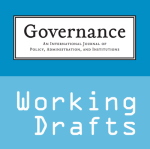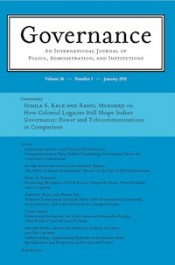Archive for the ‘Blog comments’ Category
Reply to Coen & Pegram: Three ways to fix global governance research
 Jack A. Seddon replies to our conversation on the Coen/Pegram commentary on global governance research: With three simple observations, I would like to concur with the call for a third generation of global governance research. I would further agree with Professors Coen and Pegram that global governance is failing, though it is probably too much—and a wholly ungenerous reading of the understandably polemical call to arms published in Governance—to assert that it is failing equally everywhere. My only comment is that the ubiquitous backsliding and inadequacy that characterises much of what constitutes global governance is probably only a surprise to the second generation of global governance scholarship. This, if correct, suggests three relatively concrete things about the next generation of research. Global governance analysis needs to be less functionalist and conceptual, more attuned to power and political conflict, and better grounded in its empirical claims. Read the rest of this entry »
Jack A. Seddon replies to our conversation on the Coen/Pegram commentary on global governance research: With three simple observations, I would like to concur with the call for a third generation of global governance research. I would further agree with Professors Coen and Pegram that global governance is failing, though it is probably too much—and a wholly ungenerous reading of the understandably polemical call to arms published in Governance—to assert that it is failing equally everywhere. My only comment is that the ubiquitous backsliding and inadequacy that characterises much of what constitutes global governance is probably only a surprise to the second generation of global governance scholarship. This, if correct, suggests three relatively concrete things about the next generation of research. Global governance analysis needs to be less functionalist and conceptual, more attuned to power and political conflict, and better grounded in its empirical claims. Read the rest of this entry »
Lots of big questions, but can we answer them?
Asmus Leth Olsen contributes to our discussion on public management research and the state: Doing (public administration) research is about balancing trade-offs. On one hand, we have a potential unlimited universe of big unanswered questions. On the other hand, we are faced with constraints in terms of data, methods, and theory. Great research arises when we maximize the importance of the question while minimizing the constraints on our ability to answer it. Read the rest of this entry »
Perverse incentives discourage attention to big questions
 Robert F. Durant responds to Don Kettl’s commentary on the neglect of big questions in public administration: As usual, Don Kettl makes several excellent points in his commentary about the so-called “big questions” in public administration and public management. As one of those who has written about and lectured on the negative impacts of general trends in the field on junior (and senior) scholars (1), I would add a friendly amendment to his point regarding the rewards to be gained by addressing big questions.
Robert F. Durant responds to Don Kettl’s commentary on the neglect of big questions in public administration: As usual, Don Kettl makes several excellent points in his commentary about the so-called “big questions” in public administration and public management. As one of those who has written about and lectured on the negative impacts of general trends in the field on junior (and senior) scholars (1), I would add a friendly amendment to his point regarding the rewards to be gained by addressing big questions.
To address the problem requires more than accurately pointing out that Simon or others of his era focused on big questions and garnered big professional rewards from doing so. Scholars—new and seasoned—face a very different set of incentive structures as professionals today than did those in Simon’s day, or even two decades ago. Read the rest of this entry »
Comment: In defense of big questions
This draft comment has been prepared for a panel on public management research and the state to be held at the research conference of the Public Management Research Association at the University of Aarhus in June 2016. Comments and responses are welcome. See other posts relating to this discussion.
 By Donald F. Kettl. Bubbling in the background of public management research is a huge puzzle: are researchers spending far too little time on the really big questions in the field, because of a growing instinct to drill ever-deeper into ever-smaller questions?
By Donald F. Kettl. Bubbling in the background of public management research is a huge puzzle: are researchers spending far too little time on the really big questions in the field, because of a growing instinct to drill ever-deeper into ever-smaller questions?
In a 2015 Public Administration Review article, Bradley E. Wright applauds the progress that the field has made in resolving some of its fundamental questions. The reason, he argues, is that the field “has become much more scientific” in the last two generations, because of “increasing rigor in both the qualitative and quantitative research conducted in the field.” Drilling deeper with better tools, Wright contends, has helped the field shake loose of the questions from Robert A. Dahl in 1947 about whether the field ever could be truly a science. But in his analysis of a symposium at the University of Michigan this same year, Andrew J. Hoffman points to “a crisis of relevance,” especially in ensuring that scholars engage the fundamental questions that matter and write about them in ways that will have an impact.
It’s impossible to quibble with Wright’s conclusion. The explosion of research in the field’s journals—and the increase in the number of highly regarded journals—represents advances that Dahl and other critics of the 1940s and 1950s would scarcely have imagined. But it’s also impossible to ignore the complaints of practitioners and theorists outside the field that public management is missing big trends and the potential for big impacts on big questions. Read the rest of this entry »
Public management and the state: Beginning a dialogue between two worlds
This draft comment has been prepared for a panel on public management research and the state to be held at the research conference of the Public Management Research Association at the University of Aarhus in June 2016. Comments and responses are welcome.
 By Brint Milward. About thirty years ago a cadre of young scholars (the writer included) began a movement to reorient public administration toward “the study of public management.” This was a movement that had two goals; the first was to break with the tradition of public administration, especially the normative aspects of it and second with behavioral political science. The belief was that as a professional field advice should be based on the empirical study of the structure and functioning of public organizations.
By Brint Milward. About thirty years ago a cadre of young scholars (the writer included) began a movement to reorient public administration toward “the study of public management.” This was a movement that had two goals; the first was to break with the tradition of public administration, especially the normative aspects of it and second with behavioral political science. The belief was that as a professional field advice should be based on the empirical study of the structure and functioning of public organizations.
This approach had certain implications about what the “big questions” were in the field. It also had implications about what the level of analysis was (managers, organizations, and programs) and also carried with it some assumptions about preferred method of inquiry (quantitative and synchronic). There is no arguing with the success that the public management movement has had in the United States and around the world. Whether in China, parts of Western Europe, or the United States, this is the dominant mode of research in public administration, and it has made public administration much more of a social science than it was before.
But this success has not been without its cost. Read the rest of this entry »
Reply to Coen and Pegram: The global liberal system is more fragile than you think
 Yves Tiberghien replies to a commentary on global governance research by David Coen and Tom Pegram: David Coen and Tom Pegram are right on two counts: our current global governance system is not working and our current theories of global governance are too fragmented to help us analyze the situation and suggest improvements. Yet, the problem is even more serious than what they describe. In fact, the current combination of systemic risks, dramatic power shift, and entropic forces facing our existing global governance architecture could well overwhelm it. And we could well miss it until it is too late.
Yves Tiberghien replies to a commentary on global governance research by David Coen and Tom Pegram: David Coen and Tom Pegram are right on two counts: our current global governance system is not working and our current theories of global governance are too fragmented to help us analyze the situation and suggest improvements. Yet, the problem is even more serious than what they describe. In fact, the current combination of systemic risks, dramatic power shift, and entropic forces facing our existing global governance architecture could well overwhelm it. And we could well miss it until it is too late.

Why public management is a flawed kind of statecraft
Written by Governance
December 10, 2015 at 9:04 am
Posted in Blog comments, Public management and the state